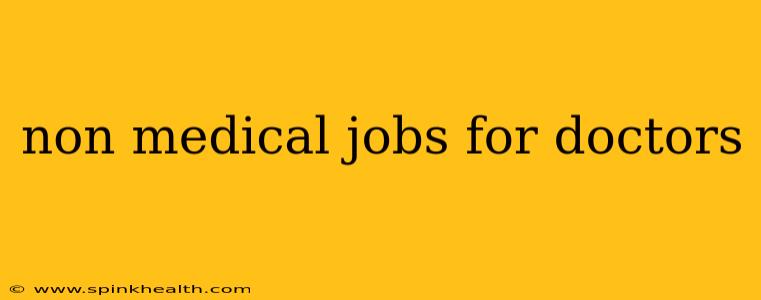The pristine white coat, the hushed reverence of the hospital corridors – for many, these are the hallmarks of a doctor's life. But what happens when the scalpel feels too heavy, the long hours too draining, or the calling shifts? What if a doctor decides to trade the stethoscope for something entirely different? The good news is that a medical degree is a powerful asset, opening doors to a surprisingly diverse range of non-medical careers. This isn't about abandoning expertise; it's about adapting it.
My own journey began with a realization. After years in emergency medicine, the relentless pressure took its toll. The human cost was high, both for my patients and myself. I needed a change, a pivot, something that leveraged my skills without the emotional weight. This exploration led me down a fascinating path, and I'm eager to share some of the possibilities I discovered.
What are Some Non-Clinical Roles for Physicians?
This isn't a list of "just" jobs; these are opportunities that benefit from a physician's unique skillset.
1. Medical Consulting:
This is perhaps the most obvious transition. Doctors understand regulations, procedures, and the complexities of the healthcare system. This knowledge is valuable to pharmaceutical companies, medical device manufacturers, insurance providers, and even startups developing health-tech solutions. Consultants provide expert opinions, strategize on product development, and help navigate regulatory hurdles. The hours can be more flexible, and the focus shifts from direct patient care to broader strategic impact.
2. Medical Writing and Editing:
The ability to communicate complex medical information clearly and concisely is a crucial skill for doctors. This translates well into medical writing and editing roles within pharmaceutical companies, medical journals, or publishing houses. You could be crafting patient information leaflets, writing grant proposals, or editing scientific papers – all while using your expertise in a supportive and less directly demanding way.
3. Medical Affairs:
This field sits at the intersection of medicine, marketing, and regulatory affairs within pharmaceutical and biotech companies. Medical affairs professionals engage with healthcare providers, providing medical information and support for company products. The work is less hands-on than clinical practice, but it allows you to remain engaged in the advancement of medicine and therapeutics.
4. Healthcare Administration and Management:
A medical background provides invaluable insight into hospital operations and management. Doctors can transition into roles overseeing departments, managing budgets, or even leading entire healthcare organizations. The focus here shifts to efficiency, strategy, and overall improvement of healthcare delivery.
5. Medical Research (Non-Clinical):
While clinical research involves direct patient interaction, plenty of research roles don't. Doctors can contribute to research in a variety of ways, from designing studies and analyzing data to writing research proposals and publications. This allows for deep intellectual engagement without the pressures of direct patient care.
6. Health Policy and Advocacy:
Many doctors find fulfillment in advocating for policy changes that improve healthcare access and quality. This could involve working for government agencies, non-profit organizations, or lobbying groups. The ability to understand the complexities of healthcare systems is incredibly valuable in this arena.
7. Medical Education and Training:
The experience and knowledge gained throughout a medical career are invaluable assets in teaching. Doctors can transition into roles as medical school professors, residency program directors, or continuing medical education instructors. Sharing your expertise with the next generation of doctors can be immensely rewarding.
Frequently Asked Questions about Non-Medical Careers for Doctors
What skills do I need to transfer to a non-clinical role? Your analytical skills, problem-solving abilities, and communication skills are all highly transferable. Add to that your understanding of the healthcare system, regulations, and patient needs, and you'll find yourself surprisingly well-equipped for many non-medical positions.
How can I make the transition? Networking is key. Attend industry events, reach out to professionals in fields that interest you, and explore online resources such as LinkedIn. Consider pursuing further education or certification in a related field to enhance your skills and marketability.
Is it difficult to find a non-clinical job? The transition requires planning and effort. Highlighting your transferable skills and tailoring your resume and cover letter to specific job descriptions is crucial. Your medical background will be a valuable asset, though you'll need to effectively communicate the skills and experience that make you a strong candidate for the specific role.
My journey from emergency medicine to medical consulting was challenging but ultimately rewarding. It involved reflection, research, and a willingness to embrace a new path. But the skills and experience gained as a physician laid a strong foundation for my success. If you're a doctor contemplating a career change, know that the possibilities are far more extensive than you might think. Your medical expertise is a powerful asset, ready to be reshaped and reapplied in exciting and fulfilling new directions.

